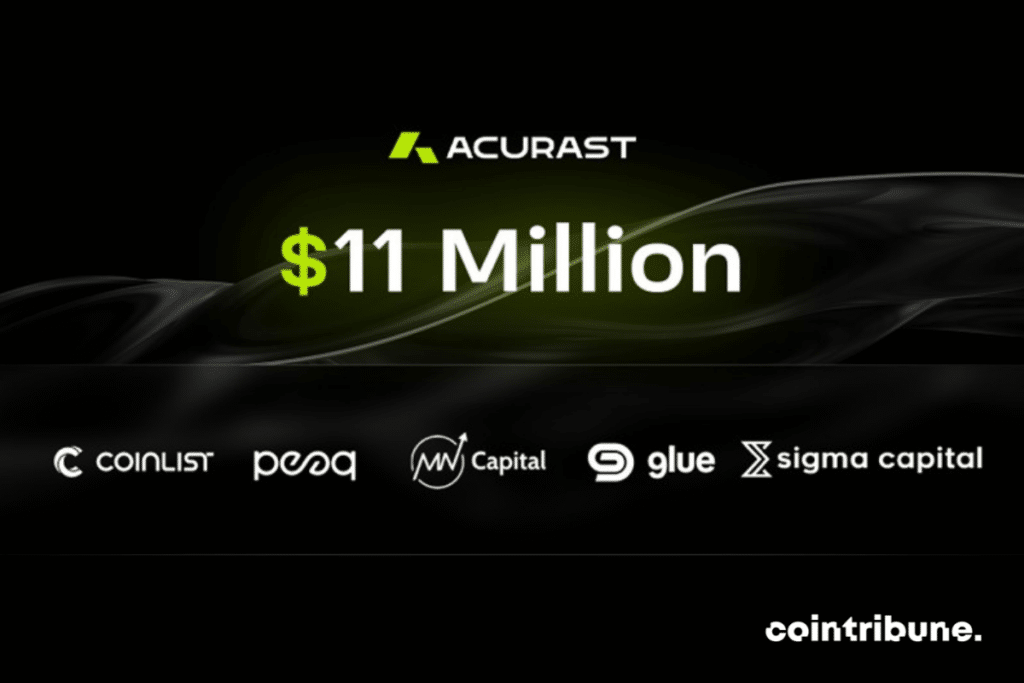Swiss Startup To Launch Cloud Alternative Powered By Phones
What if your smartphone became a global computing node ? That’s the bet of Acurast, a Swiss startup challenging cloud giants with a decentralized network relying on phones, not servers. Based in Zug, the young company announces a $11 million fundraising ahead of the launch of its Genesis Mainnet, scheduled for November 17. Its goal is to build a verifiable, confidential, and distributed computing infrastructure ready to disrupt the digital economy and the foundations of Web3.

In brief
- Acurast raises $11 million to launch a decentralized computing network based on smartphones.
- The Genesis Mainnet will be launched on November 17, along with the deployment of the native token $ACU.
- The aim is to turn inactive phones into verifiable computing nodes, without relying on data centers.
- Acurast’s testnet already shows over 146,000 connected phones and nearly 490 million processed transactions.
A strategic fundraising and the deployment of an ambitious mainnet
While Microsoft and OpenAI sealed a surprise deal, Acurast announced it raised a total of $11 million, an amount gathered across several rounds between 2023 and 2025, combining non-dilutive grants and token sales. Among these fundings was a public sale on CoinList last May, which raised $5.4 million.
This operation was largely subscribed, a clear signal of market interest. On this occasion, Acurast attracted major figures of the crypto ecosystem: Dr. Gavin Wood (co-founder of Ethereum, founder of Polkadot), Leonard Dörlochter (founder of peaq), and Michael van de Poppe (founder of MN Capital), among others.
“Acurast is creating a new computing layer owned by users, perfectly aligned with the evolution of AI,” highlighted Vineet Budki, CEO of Sigma Capital, one of the project’s investors.

The launch of the Genesis Mainnet, scheduled for this November 17, is a structuring milestone in the project’s strategy. It will mark the network’s opening to the public and the deployment of the native token $ACU. Alessandro De Carli, founder of Acurast, emphasizes the significance of this step : “the mainnet marks the moment when Acurast becomes a truly open and global computing fabric, ready to integrate into the real world.” Through this launch, Acurast aims to :
- Turn billions of smartphones into decentralized computing nodes, without relying on data centers ;
- Reduce infrastructure costs by using existing and widely available hardware ;
- Eliminate intermediaries in accessing computing power ;
- Provide secure and confidential execution on a global scale, accessible to all.
By making this pivot, the project wants to make the smartphone the basic unit of a new, accessible, resilient, and verifiable computing infrastructure layer.
Solid figures and notable pre-mainnet adoption
Beyond the fundraising, it is especially Acurast’s technical traction that is striking. Even before the launch of the mainnet, the team deployed an incentivized testnet that demonstrated its capability to operate at a large scale.
To date, over 146,443 smartphones have been registered to provide computing power. Developers have completed more than 85,784 deployments, the network has processed over 489 million on-chain transactions, and 179,000 accounts have been created. This scaling has been supported by community initiatives such as the Cloud Rebellion, a program rewarding early contributors while extending the network’s reach.
Acurast’s architecture relies on precise technical mechanisms. Task execution occurs in secure enclaves, where even the device owner cannot access the on-chain data.
Unlike other computing platforms that rely on self-declared server specifications, Acurast performs cryptographic verification of hardware, ensuring a high level of confidentiality and integrity. This positioning targets dApp developers, but also companies seeking censorship-resistant backends for sensitive use cases such as automation, AI, web crawling, or resilience testing.
With its smartphone-based model, Acurast charts a new path for the Web3 infrastructure. By combining verifiability, confidentiality, and large-scale distribution, the startup opens the door to a more resilient, decentralized, and accessible ecosystem, where each user becomes a participant in the global computing power.
Maximize your Cointribune experience with our "Read to Earn" program! For every article you read, earn points and access exclusive rewards. Sign up now and start earning benefits.
Diplômé de Sciences Po Toulouse et titulaire d'une certification consultant blockchain délivrée par Alyra, j'ai rejoint l'aventure Cointribune en 2019. Convaincu du potentiel de la blockchain pour transformer de nombreux secteurs de l'économie, j'ai pris l'engagement de sensibiliser et d'informer le grand public sur cet écosystème en constante évolution. Mon objectif est de permettre à chacun de mieux comprendre la blockchain et de saisir les opportunités qu'elle offre. Je m'efforce chaque jour de fournir une analyse objective de l'actualité, de décrypter les tendances du marché, de relayer les dernières innovations technologiques et de mettre en perspective les enjeux économiques et sociétaux de cette révolution en marche.
The views, thoughts, and opinions expressed in this article belong solely to the author, and should not be taken as investment advice. Do your own research before taking any investment decisions.